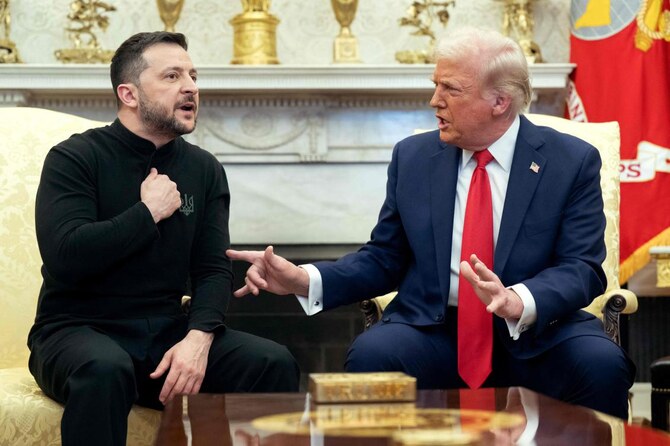BRUSSELS: European leaders lined up to show solidarity with Ukrainian President Volodymyr Zelensky on Friday, after he came under attack from US President Donald Trump and Vice President JD Vance in a stunning White House shouting match.
Within a short time, prime ministers and presidents from the north, south, east and west of the continent posted on social media in support of Zelensky and Ukraine in the war against Russia’s invasion, following the extraordinary clash.
While they did not directly criticize the US president, their comments made clear they stood by Kyiv — highlighting a major rift between traditional allies the United States and Europe over the war since Trump returned to office.
“There is an aggressor: Russia. There is a people who are under attack: Ukraine,” French President Emmanuel Macron, who visited Trump this week, posted on X.
“Respect to those who, since the beginning, have been fighting. Because they are fighting for their dignity, their independence, for their children and for the security of Europe,” Macron added.
Earlier, Trump had accused Zelensky of disrespecting the United States. The two leaders had been expected to conclude a deal on exploiting Ukraine’s mineral resources but Zelensky left the White House without signing the agreement.
Trump also said Zelensky was not ready for peace.
Polish Prime Minister Donald Tusk was among the first to show his support for Zelensky and Ukraine on social media, telling them: “You are not alone.”
European Commission President Ursula von der Leyen and European Council President Antonio Costa — the European Union’s two top officials — told Zelensky in a joint post: “Your dignity honors the bravery of the Ukrainian people.”
“Be strong, be brave, be fearless. You are never alone,” they said. “We will continue working with you for a just and lasting peace.”
German Chancellor Olaf Scholz said: “Nobody wants peace more than the Ukrainians do.”
German conservative leader Friedrich Merz, Scholz’s likely successor after his party won last Sunday’s general election, posted: “We stand with #Ukraine in good and in testing times. We must never confuse aggressor and victim in this terrible war.”
The European Union’s foreign policy chief, Kaja Kallas — a former prime minister of Estonia — was blunt in her comments.
“Today, it became clear that the free world needs a new leader. It’s up to us, Europeans, to take this challenge,” she said.
“We will step up our support to Ukraine so that they can continue to fight back the aggressor.”
Leaders from Belgium, Croatia, the Czech Republic, Ireland, Finland, Latvia, Lithuania, Luxembourg, the Netherlands, Portugal, Slovenia, Spain and Sweden were also among those expressing support for Ukraine.
By contrast, Hungarian nationalist Prime Minister Viktor Orban, a Trump ally, backed the US president.
“Strong men make peace, weak men make war,” he posted on X. “Today President @realDonaldTrump stood bravely for peace. Even if it was difficult for many to digest. Thank you, Mr. President!”
























